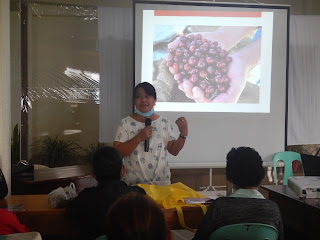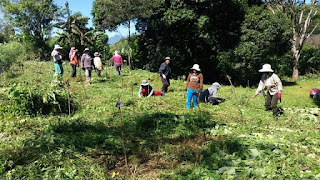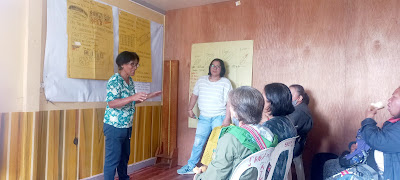[Final Report] Agroforestry : The Solution of Fragmented Forest in Tadian , Mountain Province
Duration of the Project: July 2020 - June 2022
Accomplished Activities
1. Delivery of Seedlings and Establishments of Coffee Agroforestry farms
During the last planting season, the beneficiaries planted 6,600 coffee seedlings and 1,750 forest tree seedlings. And additional Coffee seedlings were delivered from Kapi Tako Nursery, Coroz, Ambassador to the four barangays of Tadian, Mt. Province, namely, Cabunagan; Poblacion; Balboa, and Tue on August 21, 2021. Due to the demand of the beneficiaries to plant more coffee, Alnus seedlings were converted to coffee seedlings making it to 3,493 seedlings distributed to 14 beneficiaries. Distributed coffee seedlings are all red bourbon registered in the Bureau of Plant Industry (BPI); its genetic strain is traceable and guaranteed.
Planting schedules were set immediately upon the delivery of seedlings up to the end of the rainy season, which is August - October (1.5 months). Each beneficiary encouraged their family members and relatives to participate in coffee tree planting on their own farms. Accordingly, farmers observed the things they learned during the seminar on coffee cultivation. Establishing their Coffee-based Agroforestry farms is quite laborious, especially in the preparation of the plantation site and maintenance of the farm after tree planting. The community experienced rainy days throughout the year for two years, so beneficiaries' irrigation of the planted coffee hasn't become their problem. Weeding is done successively every after three months to prevent suppression of the coffee seedlings, and the beneficiaries did replanting after two months of transplanting. Farmers applied organic fertilization after six months. The motivated beneficiaries enjoyed these activities on the farms through the facilitation and encouragement of Maam Sulipa (MAO Officer) and Mr. Ganado (beneficiary representative). The two-year project completely planted 10,093 coffee seedlings and 1,750 forest tree seedlings, with an overall total of 11, 843 seedlings planted by the beneficiaries - 30 coffee growers from 6 Barangays of Tadian, Mt. Province, one Primary School, two barangay watersheds and one communal land. The accomplishment of one family brings success to the whole community.




2. Nursery Construction
The CGN decided to do the coffee seedling production in Kapi Tako nursery with the MOAPA organization for easy facilitation since staff can't assist well in constructing the nursery if it is in Tadian. Seedling production started in June 2021 and continued until December 2021. Red Bourbon seeds were procured from IFHSA-BSU and produced 8,000 seedlings distributed in Tuba for the Coffee-based agroforestry project. Others were planted by individuals interested in producing coffee on their own. Because of the project's large numbers of produced seedlings, MOAPA members were motivated to continue working for Coffee Nursery and plant more coffee; it also became an additional income for the members.
3. Monitoring and Mentoring/Sharing
Forest trees (Narra and Tue) in the watershed and communal land of Tue are thriving well, especially the Tue seedlings. However, 30% of Narra planted in Bantayan watershed were grazed by wild goats and cloud rats. MENRO office is responsible for replanting the mortality this planting season. The monitoring of the communal lands and watersheds was conducted on May 16, 2022, by Mr. Bentor Ganado and the staff of MENRO Office. While monitoring of the 18 newly established coffee plantations was conducted on May 17-19, 2022, by the CGN staff, Mr. Bentor Ganado, and the MAO Officer. Mainly coffee plantations are situated in slope areas shaded with Alnus, Benguet Pine, Prickly Narra, Acacia, Mango trees, and Indigenous trees such as Hauili (Ficus septica), Mala-tibig (Ficus congesta). Some farmers also integrated the coffee into their Banana plantations and Sugar cane farm.
During the monitoring, the growth performance of coffee, plantation orientation, species/variety suitability, coffee pest and diseases were observed.
From the keen observation of Ms. James, the growth of planted coffee is greatly affected by climatic and edaphic factors. Catimor coffee responded well to its environment, while Bourbon coffee is likely to have more attention for maintenance due to its compatibility with the climate. Each farm had at least achieved more than 85% survival rate of coffee planted. Planted coffees in 2020 are already bearing fruits and will be harvested this year. Ms. James advised each of the farmers on what to improve and to do to the plantation to become healthy–established Coffee Agroforestry farms. She always emphasized the construction of wattling in the surrounding of the planted coffee for entrapment of soil and nutrients, especially in the slope areas, and the application of mulching to keep the high moisture of the soil since the site is warm soil quickly gets dry. She advised weeding at least every 2 or 3 months for the planted coffee so the obnoxious weeds will not suppress and free from pest and diseases; monitoring at least once a month to ensure the growth development of the coffee trees are also suggested.


Project Beneficiaries Insights
Beneficiaries of the projects came from different barangay of Tadian. They're grateful that the project was conducted for them to establish their own Coffee-based Agroforestry farm. As first-time coffee growers, their experiences establishing a coffee farm are pretty challenging. Still, since they are interested, they enjoy learning about Coffee cultivation as they are reminded to be more responsible to care for the environment. They've known that growing coffee is not just to have additional profit but also to make a healthy and resilient environment. Planting nitrogen fixing trees for the shade trees would also contribute to the nitrification of the soil and sequestering carbon dioxide from the community. Of course, with the combination of coffee and some crops, the soil cover is enriched and maintains its productivity and rigidity against natural calamities.
As MAO said, these neophytes coffee growers have more things to learn about adapting the Coffee-based Agroforestry system. They're looking forward to more opportunities to strengthen and enhance their skills, especially in coffee cultivation and processing. With these numbers of beneficiaries, we could encourage more communities to plant more forest trees and coffee or do intercropping rather than Kaingin-making to have great production and protection of the land.
Project Site: Tadian, Mountain Province, Philippines
Partner Organization:Shuju Network (Japan)
Grant: Green Fund, Japan
Person in Charge : Mhyra P. Seset
-----
Partner Organization:Shuju Network (Japan)
Grant: Green Fund, Japan
Person in Charge : Mhyra P. Seset
-----
Forest fragmentation is one of the environmental problems arising in Tadian, Mt. Province due to natural calamities, deforestation thru kaingin-making, and human infrastructure development in the community. This scenario between community and forest is inevitable due to the growing population wherein people are becoming aggressive to have a progressive living. Especially now that the country is facing a health and economic crisis, people tend to return to their hometowns in the provinces and try to develop a source of living. Tendencies are forest will be divided into any kinds of land –use such as agricultural or any structural interventions made by the community, and natural resources will be depleted.
To combat this kind of environmental issue and support the implemented forest management ordinances/laws of Tadian, CGN introduced the Coffee-based Agroforestry in the year 2017- 2019 and continued in 2020 – 2022 for the protection and conservation of the forest as well as for the agro-economic development. With the multifunctional of Agroforestry to the environment, economy, and health, the locality would likely to be benefited from it. The successful establishment of coffee-based Agroforestry farms would result in a sustainable livelihood. With its long-term effect, forest cover is being protected and preserved from harmful human interventions like agricultural expansion and commercial business development, and degraded forest/ land will become productive again. Biodiversity will be enriched, community watersheds will be sustained, and climate change in the environment will be mitigated. Moreover, harvest from the farm would uplift the farmer's economic status, and the farmer's knowledge of the adaption of Agroforestry /organic farming will be enhanced.
Coffee-based Agroforestry project in Tadian was implemented on June 2020. Due to the surge of COVID-19 and its variants, the implementation of the project activities was affected, resulting in an extension for another year. The project is in partnership with Cordillera Green Network, Inc. (CGN) with Shuju Green Network (NGO Japan) and funded by the Green Fund of the National Land Afforestation Promotion Organization Japan. With the support of the Municipal Agriculture Office and Municipal Environmental and Natural Resources Office of Tadian and with the full cooperation of the beneficiaries, the activities were accomplished smoothly.
To combat this kind of environmental issue and support the implemented forest management ordinances/laws of Tadian, CGN introduced the Coffee-based Agroforestry in the year 2017- 2019 and continued in 2020 – 2022 for the protection and conservation of the forest as well as for the agro-economic development. With the multifunctional of Agroforestry to the environment, economy, and health, the locality would likely to be benefited from it. The successful establishment of coffee-based Agroforestry farms would result in a sustainable livelihood. With its long-term effect, forest cover is being protected and preserved from harmful human interventions like agricultural expansion and commercial business development, and degraded forest/ land will become productive again. Biodiversity will be enriched, community watersheds will be sustained, and climate change in the environment will be mitigated. Moreover, harvest from the farm would uplift the farmer's economic status, and the farmer's knowledge of the adaption of Agroforestry /organic farming will be enhanced.
Coffee-based Agroforestry project in Tadian was implemented on June 2020. Due to the surge of COVID-19 and its variants, the implementation of the project activities was affected, resulting in an extension for another year. The project is in partnership with Cordillera Green Network, Inc. (CGN) with Shuju Green Network (NGO Japan) and funded by the Green Fund of the National Land Afforestation Promotion Organization Japan. With the support of the Municipal Agriculture Office and Municipal Environmental and Natural Resources Office of Tadian and with the full cooperation of the beneficiaries, the activities were accomplished smoothly.
Accomplished Activities
1. Delivery of Seedlings and Establishments of Coffee Agroforestry farms
During the last planting season, the beneficiaries planted 6,600 coffee seedlings and 1,750 forest tree seedlings. And additional Coffee seedlings were delivered from Kapi Tako Nursery, Coroz, Ambassador to the four barangays of Tadian, Mt. Province, namely, Cabunagan; Poblacion; Balboa, and Tue on August 21, 2021. Due to the demand of the beneficiaries to plant more coffee, Alnus seedlings were converted to coffee seedlings making it to 3,493 seedlings distributed to 14 beneficiaries. Distributed coffee seedlings are all red bourbon registered in the Bureau of Plant Industry (BPI); its genetic strain is traceable and guaranteed.
Planting schedules were set immediately upon the delivery of seedlings up to the end of the rainy season, which is August - October (1.5 months). Each beneficiary encouraged their family members and relatives to participate in coffee tree planting on their own farms. Accordingly, farmers observed the things they learned during the seminar on coffee cultivation. Establishing their Coffee-based Agroforestry farms is quite laborious, especially in the preparation of the plantation site and maintenance of the farm after tree planting. The community experienced rainy days throughout the year for two years, so beneficiaries' irrigation of the planted coffee hasn't become their problem. Weeding is done successively every after three months to prevent suppression of the coffee seedlings, and the beneficiaries did replanting after two months of transplanting. Farmers applied organic fertilization after six months. The motivated beneficiaries enjoyed these activities on the farms through the facilitation and encouragement of Maam Sulipa (MAO Officer) and Mr. Ganado (beneficiary representative). The two-year project completely planted 10,093 coffee seedlings and 1,750 forest tree seedlings, with an overall total of 11, 843 seedlings planted by the beneficiaries - 30 coffee growers from 6 Barangays of Tadian, Mt. Province, one Primary School, two barangay watersheds and one communal land. The accomplishment of one family brings success to the whole community.




2. Nursery Construction
The CGN decided to do the coffee seedling production in Kapi Tako nursery with the MOAPA organization for easy facilitation since staff can't assist well in constructing the nursery if it is in Tadian. Seedling production started in June 2021 and continued until December 2021. Red Bourbon seeds were procured from IFHSA-BSU and produced 8,000 seedlings distributed in Tuba for the Coffee-based agroforestry project. Others were planted by individuals interested in producing coffee on their own. Because of the project's large numbers of produced seedlings, MOAPA members were motivated to continue working for Coffee Nursery and plant more coffee; it also became an additional income for the members.
3. Monitoring and Mentoring/Sharing
Forest trees (Narra and Tue) in the watershed and communal land of Tue are thriving well, especially the Tue seedlings. However, 30% of Narra planted in Bantayan watershed were grazed by wild goats and cloud rats. MENRO office is responsible for replanting the mortality this planting season. The monitoring of the communal lands and watersheds was conducted on May 16, 2022, by Mr. Bentor Ganado and the staff of MENRO Office. While monitoring of the 18 newly established coffee plantations was conducted on May 17-19, 2022, by the CGN staff, Mr. Bentor Ganado, and the MAO Officer. Mainly coffee plantations are situated in slope areas shaded with Alnus, Benguet Pine, Prickly Narra, Acacia, Mango trees, and Indigenous trees such as Hauili (Ficus septica), Mala-tibig (Ficus congesta). Some farmers also integrated the coffee into their Banana plantations and Sugar cane farm.
During the monitoring, the growth performance of coffee, plantation orientation, species/variety suitability, coffee pest and diseases were observed.
From the keen observation of Ms. James, the growth of planted coffee is greatly affected by climatic and edaphic factors. Catimor coffee responded well to its environment, while Bourbon coffee is likely to have more attention for maintenance due to its compatibility with the climate. Each farm had at least achieved more than 85% survival rate of coffee planted. Planted coffees in 2020 are already bearing fruits and will be harvested this year. Ms. James advised each of the farmers on what to improve and to do to the plantation to become healthy–established Coffee Agroforestry farms. She always emphasized the construction of wattling in the surrounding of the planted coffee for entrapment of soil and nutrients, especially in the slope areas, and the application of mulching to keep the high moisture of the soil since the site is warm soil quickly gets dry. She advised weeding at least every 2 or 3 months for the planted coffee so the obnoxious weeds will not suppress and free from pest and diseases; monitoring at least once a month to ensure the growth development of the coffee trees are also suggested.

Project Beneficiaries Insights
Beneficiaries of the projects came from different barangay of Tadian. They're grateful that the project was conducted for them to establish their own Coffee-based Agroforestry farm. As first-time coffee growers, their experiences establishing a coffee farm are pretty challenging. Still, since they are interested, they enjoy learning about Coffee cultivation as they are reminded to be more responsible to care for the environment. They've known that growing coffee is not just to have additional profit but also to make a healthy and resilient environment. Planting nitrogen fixing trees for the shade trees would also contribute to the nitrification of the soil and sequestering carbon dioxide from the community. Of course, with the combination of coffee and some crops, the soil cover is enriched and maintains its productivity and rigidity against natural calamities.
As MAO said, these neophytes coffee growers have more things to learn about adapting the Coffee-based Agroforestry system. They're looking forward to more opportunities to strengthen and enhance their skills, especially in coffee cultivation and processing. With these numbers of beneficiaries, we could encourage more communities to plant more forest trees and coffee or do intercropping rather than Kaingin-making to have great production and protection of the land.

.jpg)
.jpg)




Comments
Post a Comment